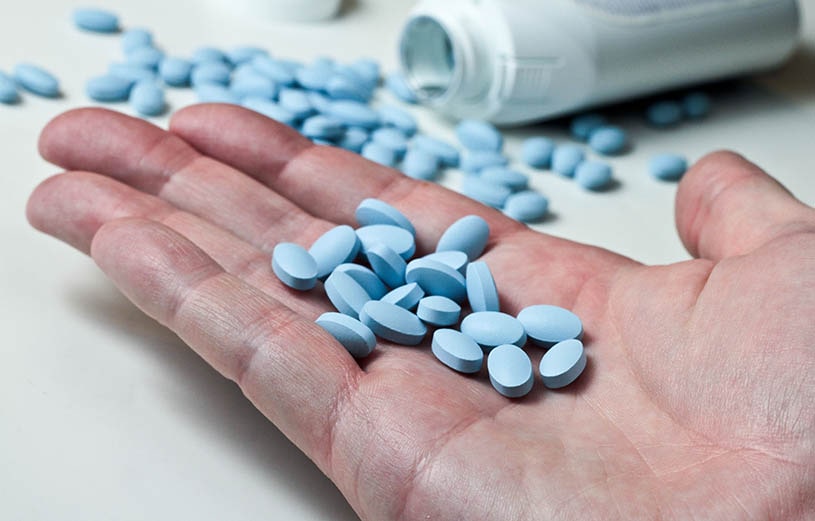The possibility of a Hydroxyzine overdose is rare but it can still occur under certain conditions. Although Hydroxyzine (generic Vistaril) is considered a safe antihistamine drug, a Hydroxyzine overdose can lead to many serious consequences, as it can induce severe effects on the human body, some, even be fatal. While the drug is commonly prescribed to treat allergies and minor conditions like motion-sickness, it also has anxiolytic (anti-anxiety) and sedative effects, which has led to abuse by some patients, primarily young people, although Vistaril overdoses are uncommon.
Table Of Contents:
Hydroxyzine aka Vistaril or Atarax, is also a commonly prescribed sleep aid. Low doses of the drug can be effective to treat the above-mentioned ailments, but some users have found that higher doses can result in euphoria and intoxication, although the information is scarce on the reasons why. Fortunately, Hydroxyzine has low abuse potential and is not as addictive as other substances.
Can You Overdose On Hydroxyzine?
The chances of experiencing a Hydroxyzine overdose are rare. According to all relevant medical information, the drug itself does not induce a dependency cycle normally found in high-abuse potential medications like painkillers or benzodiazepines. But overdoses are still possible with any kind of medication, whether accidental or intentional.
While taking Hydroxyzine alone is not guaranteed to set-off a dependency cycle, taking it with alcohol and illegal drugs may lead to adverse effects. There is more danger in other aspects of the medicine.
People with irregular heartbeats (medically known as a QT prolongation) could experience serious side effects, as well as people who are allergic to the medication and pregnant women.
Vistaril Overdose Amount
When it comes to a possible overdose of the drugs, the severity of a Vistaril overdose is heightened by the fact that there is no specific reversal agent for Hydroxyzine effects. Moreover, there is no medically proven antidote, and even hemodialysis is not useful to remove the drug from the blood.
But even though the potential for an accidental overdose is low, anyone experiencing a medical emergency because of the drug should dial 911 or their local poison control center. Any quantity above the prescribed amount by the physician will be considered as a Vistaril overdose amount. The actual quantity for achieving overdose state for a person may vary according to their body weight, and age as well.
It must be noted that a patient can experience a Hydroxyzine overdose by taking a double dose or having two doses close to each other. Doctors recommend that the patients should make up for a missed dose of hydroxyzine as soon as they remember it. However, in case the time for the next dosage is closer, it is better to skip the previous one. A person needs to consult with a doctor if one has missed a dose and is not sure what to do.

Hydroxyzine Overdose Symptoms
Taking too much Hydroxyzine can result in a range of signs and symptoms that may appear in different areas of the body. The symptoms of an overdose differ from the common side effects of taking the drug. Users should make sure that they do not confuse the two, especially if they are taking the medication as directed by their doctor.
Common Side Effects of Taking Vistaril Include:
- Dry mouth
- Upset stomach
- Headaches
- Dizziness
Hydroxyzine overdose symptoms are much more severe and require immediate medical attention if they appear and do not go away. The Most Severe Symptoms Include:
- Nausea, convulsions, and vomiting
- Hyper-sedation
- Dilated pupils
- Confusion and sheepish reflexes
- Intense sleepiness, hallucinations, and coma
- Flushed skin
- Change in heart rate and low blood pressure
- Difficulty in urination
- Sudden rashes or appearance of blisters
Taking Vistaril with other medications may also pose a risk. If a doctor prescribes this medication, patients should inform their doctor of all medications they are currently taking. The list of drugs that could possibly interact adversely with Vitrasil is long so patients should be aware of these adverse interactions.
Risk Factors And Possible Complications Of Hydroxyzine Overdose
Patients should be upfront with their medical professional if they have certain past conditions that make taking this medication risky. Information notices were sent to medical professionals in several countries outlining the potential complications for people with the following profile:
- A history of QT prolongation (prolonged recharge time of the heart)
- Family history of cardiac arrests, bradycardia, cardiac arrhythmias
- Previous use of other QT prolonging drugs
For these reasons, patients should mention to their doctor whether they have the preceding history. Or if they are already taking the medication, they should consult with their doctor or pharmacist to confirm whether they should continue taking the medication, or consider alternatives to Hydroxyzine. There have been several studies looking at the potential that Hydroxyzine has to “block hERG channels and other types of cardiac channels”, which could result in serious cardiac events and other life-threatening occurrences. Thus, patients should be forthright about any history of cardiac problems or family history of irregular heartbeats that would increase the risk factors of a severe cardiac complication.
Patients should also disclose what medications they are currently taking so their doctor knows whether or not to prescribe them hydroxyzine. Furthermore, another risk factor that increases the probability of an overdose on Atarax is the concomitant use of the drug with benzodiazepines or alcohol.
The drug interaction of the substances causes a substantial depression of CNS. As a result of this, the body can experience severe breathing impairment that will eventually lead to death in sleep.
What To Do If Someone Overdosed on Hydroxyzine?
Most of the time, Vistaril side effects are mild and temporary. They only rarely occur, and typically go away after a patient has stopped taking the medication. As Vistaril can be prescribed for several afflictions (for anything from allergies and motion-sickness to insomnia) the length of time that patients are on the medication is very short.
Patients with a previous history of taking other QT-prolongation drugs or with a family history of cardiac events should use caution when taking hydroxyzine. Taking the correct dosage at the right time should also prevent any adverse reactions related to taking too much of the drug.
The short time that patients take the drug should also stave off any potential for abuse, especially since it’s narcotic effects are slight and only come with repeated use. Hydroxyzine is also known to be non-habit forming so there is very little risk of becoming addicted or dependent.
However, in the rare event that someone is exhibiting Hydroxyzine overdose symptoms, patients should follow the same steps that apply to any case of a potential OD, which are:
- Call 911
- Call a poison control center (1-800-222-1222, toll-free)
- Listen to the advice of medical professionals, which could vary from going to the emergency room or some other remedy
- Wait for paramedics or for instructions from a medical professional before attempting any resuscitation or other treatments
- Give as much information as possible about the patient (age, medications, the condition being treated, etc.) so medical staff can properly advise
Intentional excessive use of Hydroxyzine can lead to abuse and addiction to the drug. Rehabilitation facilities with professional specialists can provide care and treatment for such patients. Family and friends of such individuals should immediately seek guidance from rehab centers and help their loved ones. The patient will have to undergo a specific substance abuse treatment program in order to eradicate the addiction.

Hope Without Commitment
Find the best treatment options. Call our free and confidential helpline
Most private insurances accepted
Page Sources
- Substance Abuse and Mental Health Services Administration, (2000), Substance Abuse Treatment for Persons with HIV/AIDS, Rockville, Maryland. https://www.ncbi.nlm.nih.gov/books/NBK64916/box/A67459/?report=objectonly
- U.S. National Library of Medicine, (2017), Hydroxyizine. Bethesda, Maryland. https://medlineplus.gov/druginfo/meds/a682866.html
- Mayo Clinic, IBM Watson Health, (2021), Drugs and Supplements: Hydroxyzine. Rochester, Minnesota, https://www.mayoclinic.org/drugs-supplements/hydroxyzine-oral-route/proper-use/drg-20311434
- Health Canada, (2016), ATARAX (hydroxyzine) - Risk of QT Prolongation and Torsade de Pointes, Montreal, Quebec. https://healthycanadians.gc.ca/recall-alert-rappel-avis/hc-sc/2016/58758a-eng.php
- Schlit, Anne‐Françoise, et. al, (2017), Risk of QT prolongation and torsade de pointes associated with exposure to hydroxyzine: re‐evaluation of an established drug, Pharmacology Research & Perspectives, United Kingdom, https://www.ncbi.nlm.nih.gov/pmc/articles/PMC5415947/
- Snitker, Soren, et. al, (2017), Association of QT-Prolonging Medication Use in CKD with Electrocardiographic Manifestations, Clinical Journal of the American Society of Nephrology, United States, https://www.ncbi.nlm.nih.gov/pmc/articles/PMC5586585/


